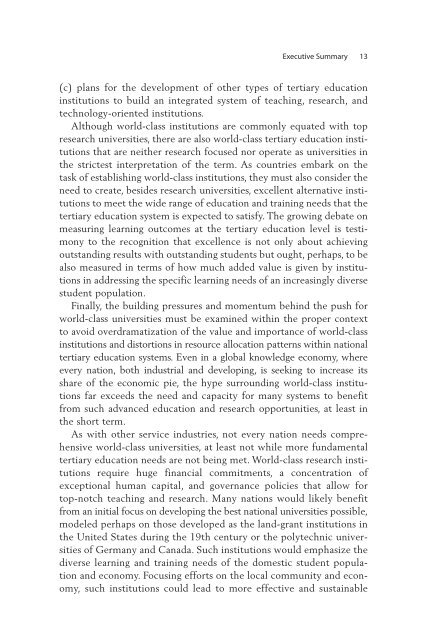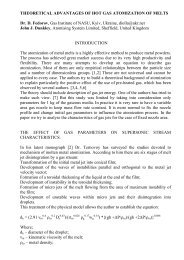The Challenge of Establishing World-Class Universities
The Challenge of Establishing World-Class Universities - ISBN ...
The Challenge of Establishing World-Class Universities - ISBN ...
- No tags were found...
Create successful ePaper yourself
Turn your PDF publications into a flip-book with our unique Google optimized e-Paper software.
Executive Summary 13<br />
(c) plans for the development <strong>of</strong> other types <strong>of</strong> tertiary education<br />
institutions to build an integrated system <strong>of</strong> teaching, research, and<br />
technology-oriented institutions.<br />
Although world-class institutions are commonly equated with top<br />
research universities, there are also world-class tertiary education institutions<br />
that are neither research focused nor operate as universities in<br />
the strictest interpretation <strong>of</strong> the term. As countries embark on the<br />
task <strong>of</strong> establishing world-class institutions, they must also consider the<br />
need to create, besides research universities, excellent alternative institutions<br />
to meet the wide range <strong>of</strong> education and training needs that the<br />
tertiary education system is expected to satisfy. <strong>The</strong> growing debate on<br />
measuring learning outcomes at the tertiary education level is testimony<br />
to the recognition that excellence is not only about achieving<br />
outstanding results with outstanding students but ought, perhaps, to be<br />
also measured in terms <strong>of</strong> how much added value is given by institutions<br />
in addressing the specific learning needs <strong>of</strong> an increasingly diverse<br />
student population.<br />
Finally, the building pressures and momentum behind the push for<br />
world-class universities must be examined within the proper context<br />
to avoid overdramatization <strong>of</strong> the value and importance <strong>of</strong> world-class<br />
institutions and distortions in resource allocation patterns within national<br />
tertiary education systems. Even in a global knowledge economy, where<br />
every nation, both industrial and developing, is seeking to increase its<br />
share <strong>of</strong> the economic pie, the hype surrounding world-class institutions<br />
far exceeds the need and capacity for many systems to benefit<br />
from such advanced education and research opportunities, at least in<br />
the short term.<br />
As with other service industries, not every nation needs comprehensive<br />
world-class universities, at least not while more fundamental<br />
tertiary education needs are not being met. <strong>World</strong>-class research institutions<br />
require huge financial commitments, a concentration <strong>of</strong><br />
exceptional human capital, and governance policies that allow for<br />
top-notch teaching and research. Many nations would likely benefit<br />
from an initial focus on developing the best national universities possible,<br />
modeled perhaps on those developed as the land-grant institutions in<br />
the United States during the 19th century or the polytechnic universities<br />
<strong>of</strong> Germany and Canada. Such institutions would emphasize the<br />
diverse learning and training needs <strong>of</strong> the domestic student population<br />
and economy. Focusing efforts on the local community and economy,<br />
such institutions could lead to more effective and sustainable







